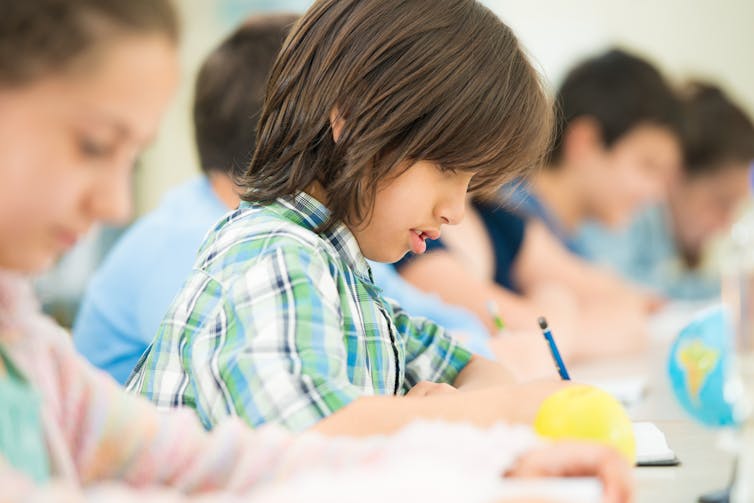Where has the joy of writing gone and how do we get it back for our children?
- Written by Edwin Creely, Lecturer in literacy and English education, Monash University
NAPLAN results indicate a decline in students’ ability to write. Outcomes in literacy, including writing, affect student achievement across multiple subject areas (including maths and science).
Read more: NAPLAN writing tests hinder creativity, so what could we use in their place?
There is a clear link between students being engaged with writing and the quality of literacy outcomes. Students’ willingness to write can be promoted by making writing more enjoyable and meaningful to young people, with authentic connections to their lives.
The power of expressive writing
Research in English and literacy education consistently shows when teachers are given the scope to tap into students’ interests, they can produce work of high quality. To increase students’ enjoyment of writing, more time could be given to creative forms of writing such as poetry, song lyrics, short scripts, personal memoirs and comic pieces, and combinations of different types of texts with visual materials in multimodal and digital composition.
 It’s important for children’s literacy for them to fall in love with writing.
www.shutterstock.com
It’s important for children’s literacy for them to fall in love with writing.
www.shutterstock.com
We now have a rich body of research and toolkits that support teachers in writing instruction. Building on good writing instruction, it’s also important for writing to be an activity done for intrinsic purposes such as pleasure. The Australian Association for the Teaching of English asserts the importance of this goal.
Writing is more than work for achieving an outcome. It’s identity work. In the enjoyment of writing, student writers can find themselves and discover the power of language. Powerful literacy skills can be gained in this discovery, with lifelong implications.
Tackling the decline in writing for pleasure in schools
Despite the link between writing for enjoyment and positive literacy results, there is accumulating evidence that writing instruction in schools is becoming limited. The current focus on forms of writing tested in standardised formats, such as tests like NAPLAN and PIRLS, puts pressure on teachers and schools to narrow writing instruction. Typically, this would mean a focus on producing essays, persuasive pieces, reports, recounts, descriptive writing and procedural texts.
Read more: Decluttering the NSW curriculum: why reducing the number of subjects isn't the answer
In NSW, Geoff Masters, the CEO of the Australian Council for Educational Research (ACER), is overseeing a comprehensive review of that state’s curriculum. He has already noted teachers and school leaders are bound by an inflexible curriculum. This includes approaches to writing and literacy that focus too heavily on prescribed functional texts. Other research by ACER suggests the need for more openness and innovation in teaching writing.
Teachers are committed to improving their students’ writing, given the emphasis in class on assessment of writing by NAPLAN and other international tests. But they also need to feel they can allow more time for unstructured or personal writing that promotes creative writing identities for students.
 A focus on testing can stifle pleasure in writing.
www.shutterstock.com
A focus on testing can stifle pleasure in writing.
www.shutterstock.com
For example, teaching multimodal composition (where two or more modes such as written language, spoken language, visual or audio are combined) and writing designed for performance alongside mandated forms of writing (such as persuasive, narrative or instructional writing) would allow students to develop important skills in writing that reflect the emerging digital world and a range of necessary literacy competencies.
The key to promoting the effective writing skills needed by students is to be found in making writing engaging, meaningful and pleasurable. Every opportunity should be taken to open up the possibilities of writing for students so they want to do it and see its relevance to their lives.
There also needs to be a shift in the current policy and assessment emphasis on specific outcomes to one which empowers teachers to promote writing to learn and writing for enjoyment.
Encouraging writing for enjoyment
What can teachers and parents do at home and at school to foster an enjoyment of writing?
 Teachers can promote enjoyable writing with meaningful writing environments.
www.shutterstock.com
Teachers can promote enjoyable writing with meaningful writing environments.
www.shutterstock.com
At home
Parents can encourage children to write for pleasure, not just for school work. For example, having a personal diary or journal, and in it writing about life, what interests them, or for imagining, storytelling and wondering.
Read more: Why the teaching of creative writing matters
At school
Teachers can open up writing for pleasure in their classrooms, either as a core activity or as an extension after other work is completed. There can be a special class time to share or perform creative and personal writing and for other students to comment about it. Teachers can also write alongside students to model good writing behaviours.
Schools can promote writing clubs where students can write together, share their writing and even self-publish it in online forums and blogs.
Authors: Edwin Creely, Lecturer in literacy and English education, Monash University





